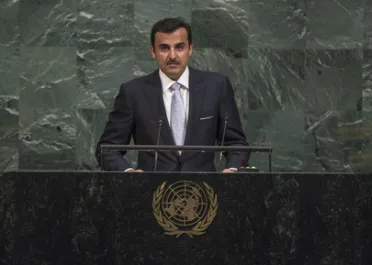Statement
Statement summary
SHEIKH TAMIM BIN HAMAD AL-THANI, Amir of Qatar, said the peaceful settling of disputes between States was still being done in an episodic and non‑binding manner. Perhaps it was time for an international convention that would impose dialogue and negotiation, he said, adding that the position of major Powers should not range between the extremes of occupation of other countries and standing idly by. Commending the theme of this year’s General Assembly session, he called on Myanmar and the international community to assume their legal and moral responsibility and take steps to stop violence against the Rohingya minority.
Since 5 June, Qatar and its people had been subjected to an unjust blockade imposed by neighbouring countries, he said. Those countries had also interfered in the internal affairs of many States, inflicting damage on the war on terror while opposing reform and supporting tyrannical regimes. Qatar had refused to yield to pressure, he said, expressing his country’s readiness to resolve differences through compromises and calling for unconditional dialogue based on mutual respect for sovereignty.
Terrorism and extremism were among the world’s most serious challenges, he said, emphasizing that Governments had no choice but to cooperate and to address social, political and cultural root causes. Care must be taken, however, not to make the fight against terrorism an umbrella for reprisals or the shelling of civilians. Qatar also rejected the use of double standards in tackling terrorism and extremism, which could not be linked with any particular religion, race, civilization, culture or society, he said.
Israel still stood in the way of a lasting, just and comprehensive peace in the Middle East, he said. The international community must give high priority to the resumption of peace negotiations that would end the Israeli occupation of Arab territories within a specified time frame in accordance with the two‑State solution and the establishment of an independent Palestinian State with Jerusalem as its capital. He appealed to Palestinian brothers to complete national reconciliation and to speak with unity.
Turning to the situation in Syria, he said serious work must be carried out to reach a political solution that would meet the Syrian people’s aspirations for justice, dignity and freedom while maintaining the country’s unity and sovereignty. Qatar would spare no effort to help alleviate the humanitarian suffering of its Syrian brothers. On Libya, he said the Government of National Accord must be supported in its efforts to restore stability and counter terrorism. Qatar also supported the Government of Iraq’s efforts to achieve security, stability and unity. On Yemen, he said its unity, security and stability must be maintained, and for humanitarian access to be facilitated. He went on to call a constructive dialogue between the Gulf Cooperation Council and Iran based on common interests, good neighbourliness, respect for State sovereignty and non-interference in internal affairs.

